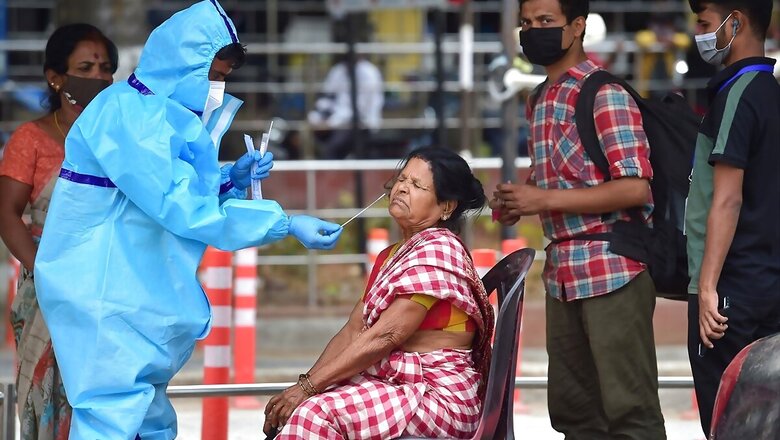
views
Like all major cities of the country, Bengaluru has been witnessing a spike in Covid-19 cases over the past few days. Though it’s behind Mumbai and Delhi at this time, experts say in a week or two the city could see very big numbers. With beds for coronavirus patients becoming sparse, several hotels have come forward to convert their properties into Covid care centres. Civic body Bruhat Bengaluru Mahanagara Palike (BBMP) and the Karnataka health department have conducted meetings with hoteliers of the state capital on the matter and reached an understanding.
Karnataka reported 14,859 new Covid-19 cases, 4,031 discharges and 78 deaths in the previous 24 hours, as per the state health bulletin on Friday evening. With this, the total Covid tally of the state reached 11,24,509, including 1,07,315 active cases. Bengaluru constitutes around 60% or more of these cases. What is it about the state capital that has led to the pandemic having such a firm grip over it?
To understand the overall scenario, one must understand the characteristic population of any metropolitan city. When Mumbai and Delhi shut down in their own ways, migrants from Karnataka returned to their homes. Though everyone had a negative report for the “gold standard” RT-PCR test while crossing the state borders, experts say the findings are not always 100% accurate. There are chances that the viral load in a person might not be high enough at a certain time to be detected by the RT-PCR process.
Just like any metro city, Bengaluru is a work centre with more population density compared to rural parts. Hence, the Covid-19 transmission rate is also high here. The living situation of the lower middle class is also less than suitable with unhygienic conditions and poor ventilation making them susceptible to infections. The crowds are not managed well in public places like markets. Weddings and other mass gatherings are happening all around, flouting Covid protocol. According to observers, people are negligent about the guidelines and one can see hundreds wandering about without even wearing a mask properly or maintaining a physical distance.
Also, bypolls for a Lok Sabha and two assembly seats in Karnataka will be held on Saturday and for the past several days workers from various parties have been travelling to the city frequently to meet their leaders. The Vidhana Soudha is the centre of power and gets hundreds of visitors daily.
According to Prof L Srinivas Murthy, senior consultant physician at Lifecare Hospital in Bengaluru, at least 30 crore Indians need to be vaccinated for the virulence of Covid to be reduced. “That’s when we can speak of herd immunity as a notable step. There are medical reasons and societal reasons for the rapid spread of the infection. While it is easy to blame either the civic body or the people for the existing situation, both need to be as responsible to curb the spread,” he said. “Last year every positive patient was seen spreading the infection to 2 persons. This time that number has increased to 3-5. For every infected, there are roughly 30 people that are asymptomatic and go undiagnosed. This is a bigger threat than anything.”
A deadly second wave of infections has been tearing through several parts of India, forcing authorities to tamp down the movement of people and ramp up the ongoing vaccination exercise.
Last year, during the first wave, around 18 hotels in Bengaluru were active Covid care centres. As of now, 3 hotels in the city have been turned into Covid care centres. There are over 1,000 hotels in Bengaluru that have more than 50 beds each. Only such establishments are fit to be converted into Covid hospitals. More will be added as and when the BBMP feels necessary, say sources.
Hotels that are adjacent to big hospitals are permitted to operate as Covid care centres initially. According to the guidelines issued, the hospital will be in charge of the patients’ treatment and well-being. The hotel will look after the facilities. The same set of Covid-treating doctors will look after patients at the hospital and the hotel. This is expected to reduce the burden on the hospital as well.
Suguna Hospital in Rajajinagar, Apollo Hospitals in Sheshadripuram and Manipal Hospitals have one hotel each tied up to them for now, said PC Rao, president of the Bruhat Bengaluru Hotel Association.
”In all the meetings that were held with hoteliers, the health department and BBMP anticipated the load on Covid centres to be lesser this time. Most patients who are asymptomatic are treated in home isolation. Only those who do not have a separate room and toilet facility at their house are shifted to hospitals. And only when hospitals are full, will the patients be shifted to hotels,” he said.
Hotels will have patients that are asymptomatic and with mild symptoms. They will have oxygen facilities ready for emergency situations. If at any point in time, a patient’s condition worsens, they will be shifted to the in-charge hospital immediately. This time around, only 10% of the overall positive patients will need hospitalisation and that looks like a manageable number, said a senior official from BBMP.
“Also, the hotels are anyway running empty with no guests due to the Covid scenario. By turning into Covid care centres, they can also make some money that would help them run the facility,” said Rao. “BBMP hasn’t capped the prices that the hospitals can charge. A few more meetings are scheduled this weekend with the hoteliers to conclude the price list and payment modes.”
(With inputs from Sakshi Sundriyal)
Read all the Latest News, Breaking News and Coronavirus News here. Follow us on Facebook, Twitter and Telegram.




















Comments
0 comment